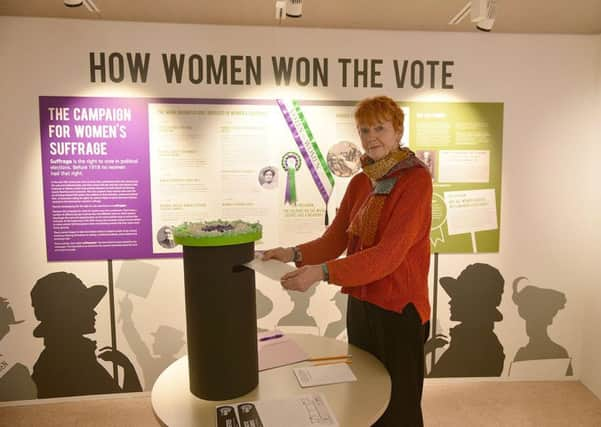Pioneering women hailed in South Shields suffragette exhibition


Titled Discover How Women Won the Vote, it tells of the heroines who overcame the odds – and male-dominated society – to make the ballot box their own.
The initiative, at The Word: National Centre for the Written Word in South Shields, highlights those within the national and North East suffrage movements who played important roles.
Advertisement
Hide AdAdvertisement
Hide AdTheir campaign led to a limited number of women gaining the vote in 1918, with all women over the age of 21 doing so in 1928.
Opened by Dame Vera Baird QC, the Police and Crime Commissioner for Northumbria, the exhibition also focuses on those in South Tyneside who broke new ground in local politics.
They include Elizabeth Thorpe, who in 1927 became the first female elected to South Shields Town Council.
Ellen Trainor, who in 1930 became Jarrow’s first woman councillor and its first lady mayor 20 years later, is also featured.
Advertisement
Hide AdAdvertisement
Hide AdDame Vera, a former Labour MP for Redcar, said the exhibition was important in bringing to light the struggle for the vote to a modern generation.
But she also said work to bring equality for women across society is not yet complete – and she fears it may still be decades away.
She added: “The whole of society has to be more even - women have been hidden from history.
“Legislation for equal pay was introduced in 1970, but it has been estimated that it could be another 40 years before that is achieved.
Advertisement
Hide AdAdvertisement
Hide Ad“The exhibition is excellent, and it’s important to raise awareness of the suffrage movement.”
The free exhibition, which runs until May 3 and is supported by the Port of Tyne, tells how some suffragettes were imprisoned, force fed and beaten.
Visitors can cast their vote, in a specially-created ballot box, for the most influential woman from the exhibition.
Dame Vera cast hers for Lizzie Crow, from Jarrow, who did her bit for women’s suffrage in 1912.
Advertisement
Hide AdAdvertisement
Hide AdLearning that Winston Churchill, then the First Lord of the Admiralty, was delayed on a ship while on a visit to Newcastle, she hired a boat and harangued him by megaphone.
Tania Robinson, head of marketing and culture at The Word, said: “Very often the role of ordinary women is forgotten in the story of women’s suffrage, yet here in the North East they really did play a key role in the movement.”